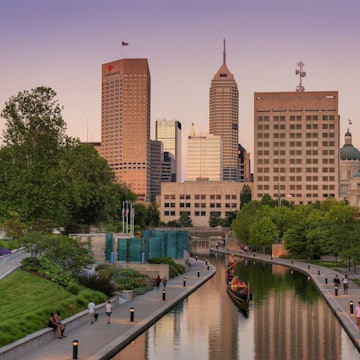

Cincinnati is a car city, but recent improvements in public transportation makes it much easier to navigate © Adam Jones / Getty Images
Getting around in Cincinnati may come with some rush-hour congestion, because, like much of the Midwest, driving is the predominant mode of transportation. This is also due to how spread out and hilly the city is. Cincinnati neighborhoods are strewn across miles upon miles of rolling hills, so while the neighborhoods themselves are pedestrian-friendly, getting from one to the next requires some legwork (or a car or bus).
A web of main streets and three major highways connect the neighborhoods. But if you’re interested in getting around Cincinnati without a car, the new Cincinnati streetcar, bikeshare system and bus service make that possible. Here are five of the best ways to get around in Cincinnati on your next Queen City visit.

Car
Navigating Cincinnati is relatively simple; the city has several main roads that string together its neighborhoods, with Interstates 75, 71, and 74 getting northbound drivers to Dayton, Columbus and Indianapolis (respectively), and I-75 and I-71 taking southbound drivers into Kentucky. (Cincinnati is I-74’s southern terminus.) While its roadways are easy to navigate, traffic can get a bit frustrating. Regular roadwork, which is notoriously taxing on I-75, brings congestion to Cincinnati’s highway system come rush hour. But if you avoid peak driving time, and you look ahead in your navigational system, you shouldn’t face too many driving issues.
Street parking is available across most Cincinnati neighborhoods; in more popular destinations, like Over-the-Rhine (OTR), downtown and Hyde Park Square, you’ll need to pay for parking. Download the Cincinnati parking app, Cincy EZPark, ahead of your visit. (Most meters accept credit card, too.) Garages and lots abound in downtown and OTR; prices are typically $1 to $7 per hour, although expect higher fares if the Cincinnati Bengals or Cincinnati Reds have a home game. Rideshare services like Lyft and Uber are also available for getting around the city, and for to and from the CVG Airport.
Tip for renting a car: If you’re flying into Cincinnati, CVG is the best place to rent a car. A free airport shuttle takes travelers from baggage claim to the rental-car lots. If you’re looking to rent a car for a quick day-trip from Cincinnati, several rental options are available in downtown Cincinnati. Zipcar also rents near the University of Cincinnati campus.

Streetcar
The Cincinnati Bell Connector tram system was more than 15 years in the making before it opened for its first ride in September 2016—making getting around Cincinnati without a car easier than ever. This modern Cincinnati streetcar system doesn’t connect all of Cincinnati, but it does link the downtown and OTR neighborhoods for 3.6 north-to-south miles. The streetcar features 18 stops, and connects major attractions like gathering spot Fountain Square and historic and open-air Findlay Market, not to mention The Banks, home to Smale Riverfront Park and the Cincinnati Reds ballpark and the Cincinnati Bengals stadium.
Getting around in Cincinnatifree fare may come with some rush-hour congestion, because, like much of the Midwest, driving is the predominant mode of transportation. This is also due to how spread out and hilly the city is. Cincinnati neighborhoods are strewn across miles upon miles of rolling hills, so while the neighborhoods themselves are pedestrian-friendly, getting from one to the next requires some legwork (or a car or bus).
Getting around in Cincinnatihere may come with some rush-hour congestion, because, like much of the Midwest, driving is the predominant mode of transportation. This is also due to how spread out and hilly the city is. Cincinnati neighborhoods are strewn across miles upon miles of rolling hills, so while the neighborhoods themselves are pedestrian-friendly, getting from one to the next requires some legwork (or a car or bus).
A local’s tip for getting around Cincinnati with a baby: The streetcar has room for strollers, so other than a car, it’s one of the best ways to get around Cincinnati with a baby. (Bikes, wheeled luggage, and grocery carts are allowed on as well.)
Bus
Another great way to get around Cincinnati without a car, beyond OTR and downtown, is the city’s Metro bus system. It connects all major Cincinnati neighborhoods, and also links the CVG airport (actually in northern Kentucky) with the rest of Cincinnati. In 2020, the Metro received a massive influx of funding to make it an easier and more enjoyable means of transportation; new perks include shorter wait times and including WiFi and charging ports in updated buses.
Currently, the bus system sees about 50,000 regular riders; many riders use the Transit app to plan their route and pay online fare, but you can also pay on the bus as you enter. Catch the bus by waving your hand as it approaches your stop. Show the driver your fare payment via the app; alternatively, swipe or drop your fare in the farebox.
A local’s for finding WiFi-enabled buses
Cincinnati is in the early stages of adding WiFi to its buses. To determine whether or not your bus will have it, look for the blue “Go Metro WiFi” logo near the outside door.

Bike
Cincinnati Red Bike is one of the most scenic methods of commuting—especially with the system’s new addition of electric bikes, which reach speeds of up to 17 miles per hour. The city has 100 bikes and nearly 60 bike stations sprinkled across Cincinnati and Northern Kentucky, largely concentrated around the downtown, OTR and Clifton/ University of Cincinnati neighborhoods, as well as the towns of Covington and Newport in Northern Kentucky.
Rent bikes via the station kiosk; return your wheels at any available station (there must be empty space available for docking). A single ride pass runs for $3 per 20 minutes; if you’re planning on a longer ride, such as a riverfront jaunt on the southern end of the Ohio to Erie cross-state trail, rent a day pass for $10.
One thing to keep in mind while cycling around Cincinnati: it’s hilly. Prepare to sweat if you’re heading from downtown to Mount Adams or Hyde Park. For an easier ride, cycle below the hills on the riverfront or through downtown into OTR.
A local’s tip for safe riding
Unless you’re riding along the riverfront or other dedicated bike or multipurpose trails, you’ll be cycling alongside traffic. As an urban cyclist, the same rules that apply to cars apply to bikes. Stop at stop signs, use hands as traffic signals and ride with traffic. See here for more bike-safety tips.

On Foot
Is Cincinnati pedestrian-friendly? Yes and no. It’s easy to walk around each neighborhood, with sidewalks, pedestrian traffic signals and relatively short distances from one place to the next (especially in spots like downtown, OTR and Mount Adams). But, with Cincinnati’s ultra-hilly landscapes, walking from one neighborhood to the next can be a bit taxing, especially if you go north or east of downtown and OTR.
Are you up for the challenge? The easiest neighborhood-to-neighborhood pedestrian routes include walking from the riverfront to downtown to OTR. You can also walk east from downtown and the riverfront to Mount Adams via staircases, but expect a heart-pumping several minutes, because “mount” is not a misnomer here.
The Ohio River bridges also offer pedestrian transport by connecting the Cincinnati riverfront and Northern Kentucky. The pedestrian-only Purple People Bridge links Cincinnati’s Sawyer Point Park with Newport, Kentucky. The bright-blue John A. Roebling Suspension Bridge joins Smale Riverfront Park and The Banks neighborhood with Covington, Kentucky.
Accessible transportation in Cincinnati
In addition to car transport, the Metro bus system is the most accessible way to get around Cincinnati. The system is 100 percent ADA-accessible, with all buses including a wheelchair lift or ramp, with two securement areas designed for mobility devices and wheelchairs. Service animals are allowed on the Metro as well.
For more information on accessible travel check out Lonely Planet’s accessible travel resources.
















